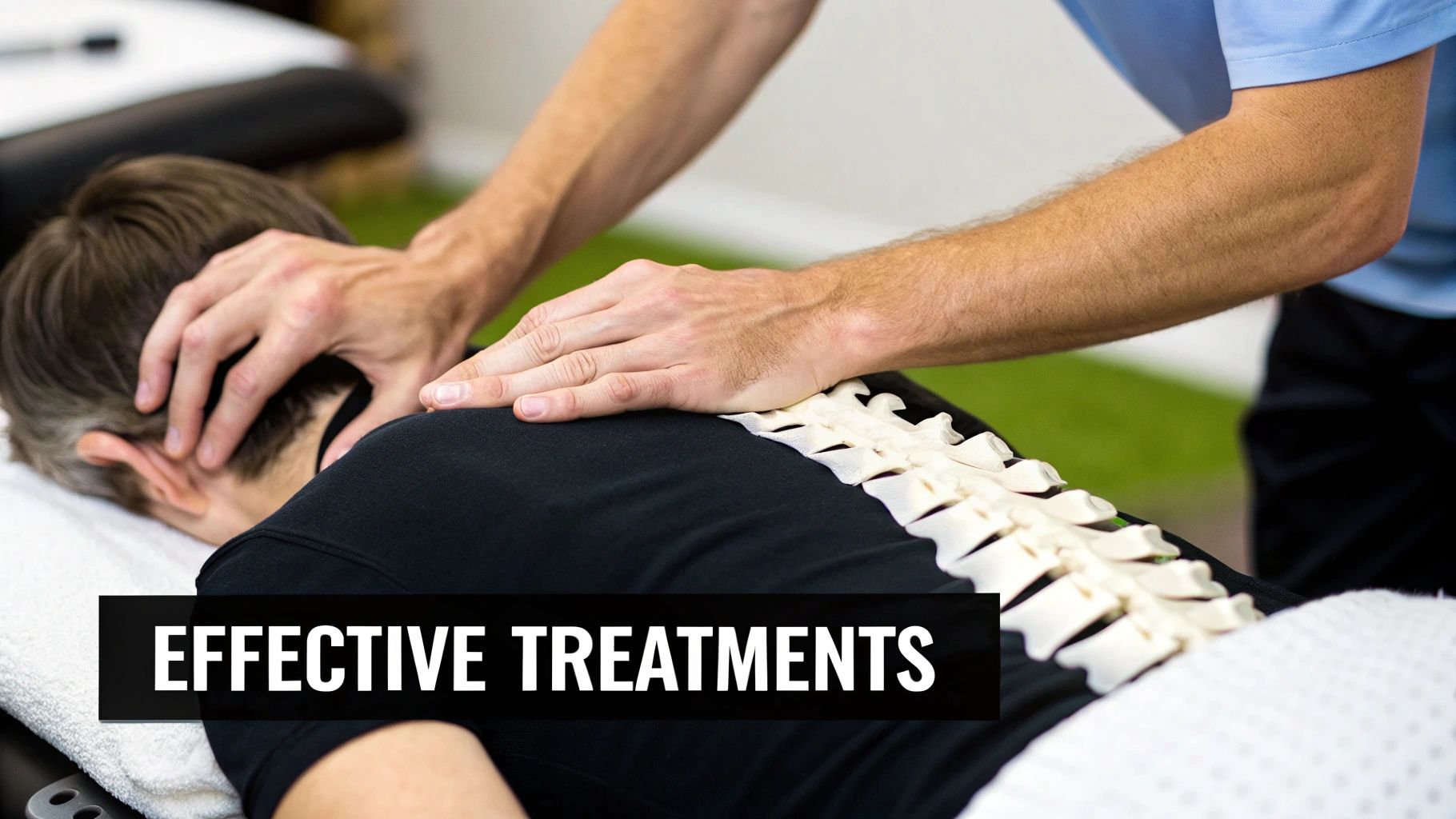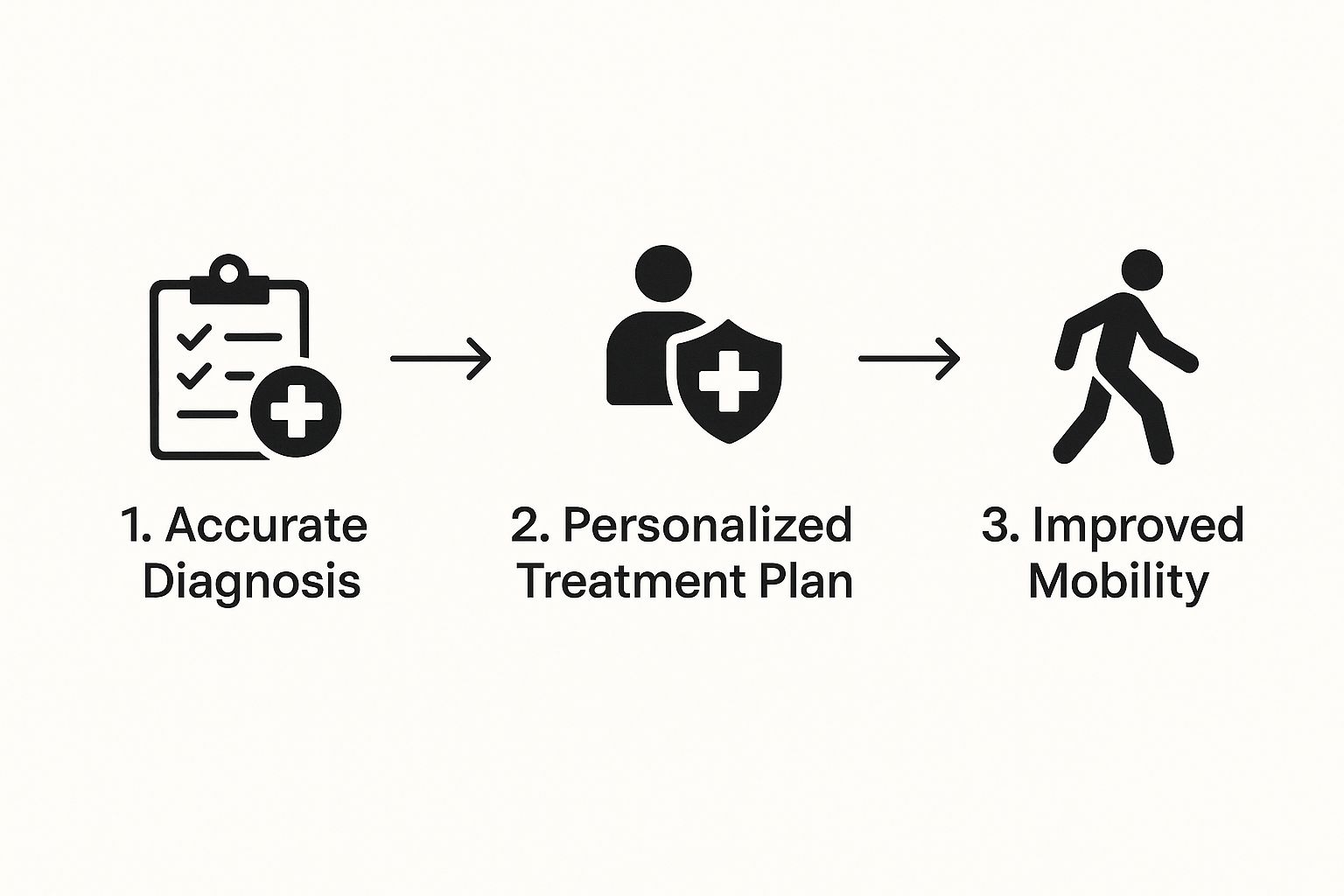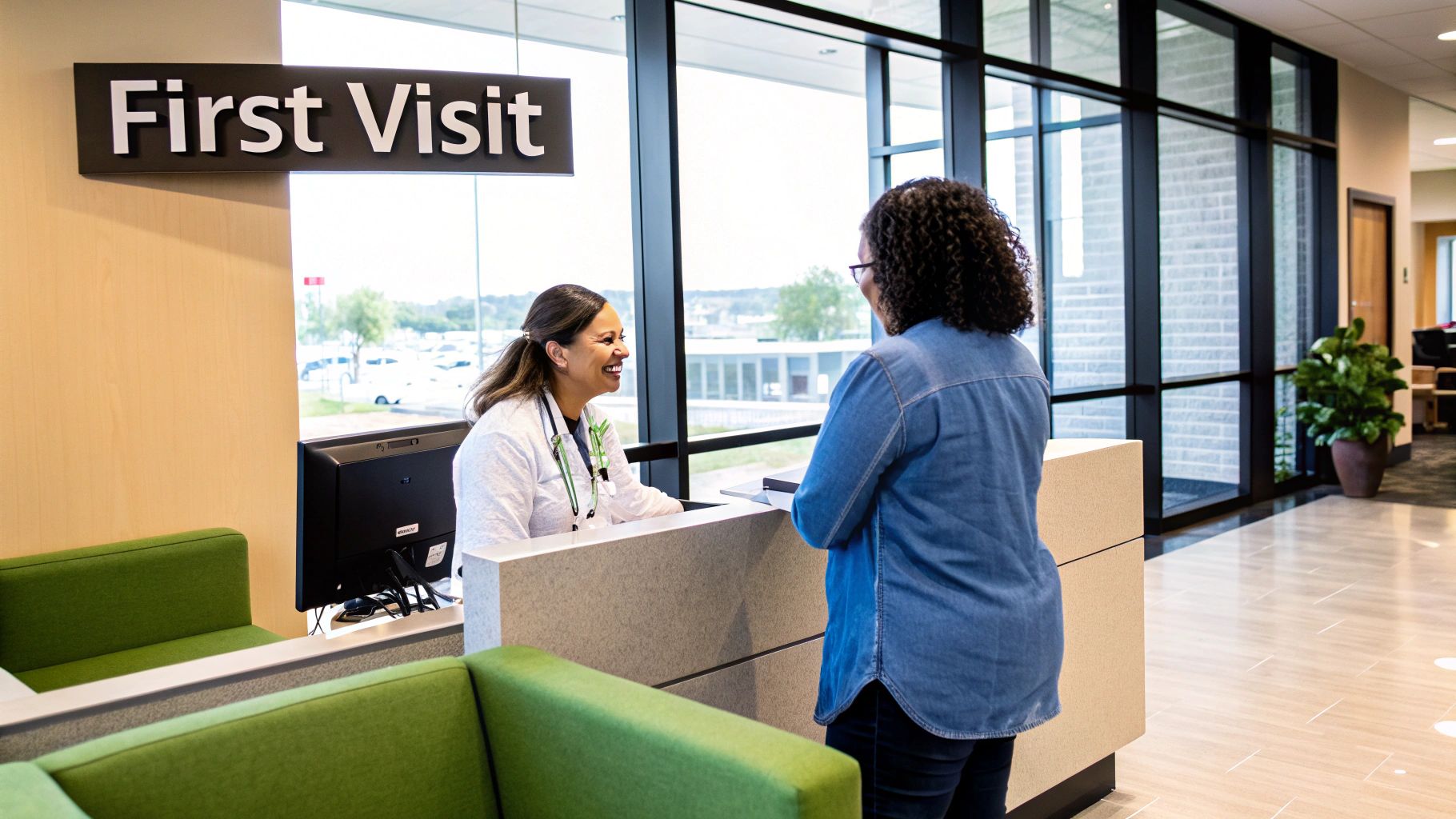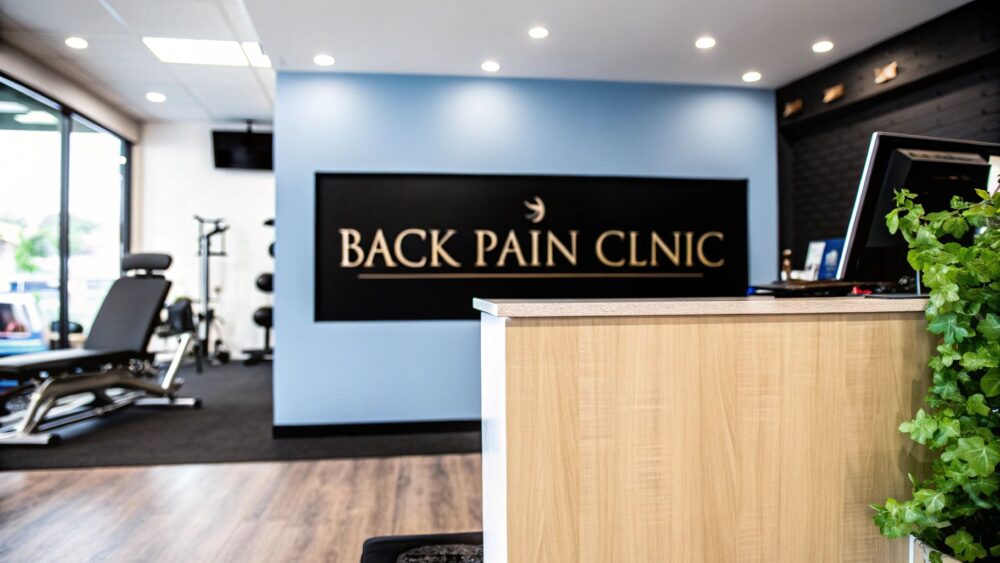If you've ever typed "back pain clinic near me" into a search bar, you know the frustration. The internet is flooded with generic advice—rest more, do some stretches, take a painkiller. But when the pain just won't quit, you quickly realise that cookie-cutter tips aren't getting to the root of the problem.
Real relief requires a targeted approach. Finding specialised care is the key to finally breaking the cycle of aches, stiffness, and discomfort that holds you back. Ready to find a solution that works? Let’s explore how.
Why Generic Advice for Back Pain Falls Short

Living with persistent back pain is exhausting. It doesn't just hurt; it saps your energy, affects your mood, and creeps into every part of your life.
The problem with one-size-fits-all advice is that it completely ignores the unique factors of your body and your daily routine. It's the difference between just managing the symptoms and actually solving the underlying cause.
The Real Impact Of Persistent Back Pain
When back pain becomes a constant companion, the effects ripple outwards. We see it every day. It's more than just a physical ache; it's:
- Reduced productivity at work because you can't focus through the discomfort.
- Interrupted sleep that leaves you feeling tired and foggy all day.
- A constant sense of stress and anxiety around simple movements, like picking something up or getting out of a chair.
And you're far from alone in this. A recent study revealed that back pain affects over 22% of adults in the UK. That's more than 11.6 million people dealing with chronic musculoskeletal pain, with back issues leading the pack.
“I spent weeks following random stretching guides I found online, only to see my pain get worse,” shares Emma, a graphic designer. "It felt like I was just guessing, and my body was paying the price."
Why One-Size-Fits-All Tips Fail
Generic exercises are a shot in the dark. They might accidentally overload an already inflamed joint or completely miss a crucial muscle imbalance that's causing all the trouble in the first place.
A proper clinical assessment, on the other hand, is designed to uncover exactly what's going on. It’s a game-changer. A specialist can:
- Identify the specific weak areas that need strengthening.
- Create a personalised plan for lasting, genuine relief.
- Track your progress so you know what's working and what isn't.
Our guide on the best exercises for back pain dives deeper into how targeted movements can bring much better, and safer, results. It’s about moving away from guesswork and towards real, measurable solutions. That shift from simply managing symptoms to tackling the root cause is what transforms your recovery.
How Finding A Specialist Changes Everything
A specialist team uses proven, evidence-based tools to diagnose your exact issue. No more guessing games.
You get targeted therapies designed for you, consistent feedback on your progress, and the ongoing support needed to make real headway. This structure means you can get back to work, your hobbies, and your life much faster and with more confidence.
A specialist approach provides:
- Expert monitoring to catch any issues early on.
- Bespoke adjustments to your plan as your body improves.
- Accountability to keep you motivated and on the right track.
Your search for a "back pain clinic near me" should be a search for proven outcomes. While generic tips might offer a fleeting moment of ease, specialised care builds lasting progress that you can feel every single day.
Don't settle for temporary fixes when a clinical approach can get to the heart of the matter. Moving past generic guidance is the first real step toward reclaiming your life from pain. Your body deserves more than a one-size-fits-all solution, and the right help is available.
How to Start Your Search for a Local Back Pain Clinic

Starting the hunt for the right clinic can feel a bit overwhelming, but a little structure goes a long way. Most people’s first instinct is to type "back pain clinic near me" into Google, and while that’s a start, you’ll get much better results by being more specific.
Think about what makes your pain unique. Are you dealing with sciatica? A suspected disc issue? Or maybe it’s a stubborn, general stiffness in your lower back.
Using sharper search terms like "sciatica specialist in Milton Keynes" or "lower back pain assessment near me" is a game-changer. It helps you cut through the noise and connects you with clinics that actually have deep experience with your specific problem. This way, you find specialists who get the nuances of your discomfort, not just generalists who might lack the focused expertise you really need right now.
Tapping into Trusted Offline Resources
Don’t just rely on your screen. Your local community can be an incredible resource for finding a clinic you can trust.
Often, the best first port of call is your GP. They can give you a referral to a trusted specialist on the NHS or point you towards private clinics they know have a solid reputation. In the UK, a GP referral adds a valuable layer of professional vetting.
Beyond that, talk to people you trust. Ask friends, family, or even colleagues if they’ve dealt with similar issues. A personal recommendation can offer insights you’ll never find in an online review, like how a practitioner really listens or what the clinic’s atmosphere feels like.
A personal referral can cut through the noise of online marketing. Hearing "they really listened to me and created a plan that worked" from someone you trust is one of the most powerful indicators of quality care.
How to Properly Read Online Reviews
Once you’ve got a shortlist, it’s time to see what other patients are saying. Online reviews are a goldmine of information, but you have to know how to read between the lines.
Look for patterns, not just one-off comments. A single bad review buried amongst dozens of glowing ones might just be an outlier. But if you see consistent complaints about poor communication or long waits for appointments, that’s a red flag.
Pay extra attention to reviews that go into detail about the treatment itself and the results. These are usually far more genuine than vague, five-star testimonials.
- Look for specifics: Does the review mention the person's condition and explain how the treatment helped them?
- Check for recent feedback: Are the great reviews from last month or from five years ago? Things can change.
- Analyse the language: The most authentic reviews often mention both the good and the not-so-good, giving you a much more balanced picture.
When you begin your search, it can be helpful to explore a wide range of practitioners. For example, you might come across an Ayurveda therapist alongside more conventional specialists. Broadening your search like this can open your eyes to different care options. By mixing solid online research with trusted offline advice, you’ll build a well-rounded picture and turn a huge list of search results into a handful of clinics that are genuinely worth your time.
How to Properly Evaluate and Compare Back Pain Clinics
You’ve done the initial research, and now you have a shortlist of clinics. This is the crucial step. You're no longer just searching for a "back pain clinic near me"; you're trying to find the right one for you. Making a good choice now can completely change your recovery experience.
A huge part of this is understanding a clinic's treatment philosophy. Do they offer a multidisciplinary approach? This just means they have a team with different areas of expertise who all work together on your care. It's a sign they're looking for a proper, well-rounded plan rather than just a quick, temporary fix.
What to Look for in a Top Clinic
The best clinics focus on rehabilitation and long-term health, not just patching up symptoms. They should be obsessed with finding the root cause of your pain so it doesn’t come back.
This is more important than you might think. While most cases of non-specific low back pain get better within six weeks, a massive 60-80% of people have it come back within a year. You can read the full analysis from the NHS to see just how common this cycle is.
You want a clinic that combines different treatments to break that cycle. Look for a mix of things like:
- Manual Therapy: Hands-on techniques to get your joints moving better and ease muscle tension.
- Personalised Rehabilitation: A specific exercise plan made just for you, designed to strengthen weak spots and improve how you move.
- Patient Education: Real advice on your posture, lifestyle changes, and things you can do yourself to stay in control of your recovery.
The image below really sums up the ideal process: it all starts with an accurate diagnosis, which leads to a personalised plan, and that's what gets you moving better.

It’s a good reminder that effective treatment isn't a one-off event. It's a structured journey toward feeling good for the long haul.
The Importance of Practitioner Qualifications
Don't ever feel awkward about checking the credentials of the practitioners. Any good clinic's website will make it easy to see the team's qualifications, specialisations, and experience.
A great practitioner doesn't just treat your back; they treat you. They listen, ask the right questions, and make you feel like you're a partner in your own recovery. That collaborative feeling is a really strong sign of a high-quality clinic.
Knowing who will be guiding your recovery is vital for building trust. It's completely reasonable to want to meet the experts and get a feel for the team before you commit to anything.
To make things easier when you're comparing your top choices, use a simple checklist. It helps you step back and assess each option without getting overwhelmed.
Clinic Comparison Checklist
Here's a straightforward table you can use to compare the clinics on your shortlist. Just fill it in as you do your research or after you make your initial calls.
| Criteria | Clinic A | Clinic B | Clinic C |
|---|---|---|---|
| Multidisciplinary Team? | |||
| Focus on Root Cause? | |||
| Personalised Plans? | |||
| Practitioner Experience | |||
| Online Reviews/Testimonials | |||
| Feel from First Call? | |||
| Location/Convenience |
Once you've filled this out, the best option often becomes much clearer.
Questions to Ask During Your First Call
When you phone the clinics you've shortlisted, have a few key questions ready to go. This first chat is your chance to get a feel for their approach and see if it’s a good fit. Think of it less like booking an appointment and more like a mini-interview.
Try asking things like:
- What’s your clinic’s overall approach to treating back pain?
- This question gets right to their philosophy. Are they all about quick fixes, or are they focused on sustainable, long-term results?
- Do you create a personal treatment plan for every patient?
- The answer here should be a confident "yes." A one-size-fits-all approach is a massive red flag.
- What’s your experience with conditions like mine?
- If you know what you're dealing with (like sciatica or a suspected disc issue), mention it. This confirms they have the right expertise.
- What does a typical first appointment involve?
- This gives you a clear idea of how thorough they are and what to expect when you walk through the door.
Listen closely to their answers. A confident, clear response usually comes from a clinic that is organised, knows its stuff, and is genuinely ready to help you get back on your feet.
What to Expect During Your First Consultation
Walking into any new clinic can feel a bit daunting, especially when you're already dealing with nagging back pain. Knowing what to expect from that first appointment can make all the difference, helping you feel more in control and turning the visit into a truly collaborative session.
The whole point of this initial consultation is to get a crystal-clear picture of what's going on so we can build an effective, precise treatment plan just for you.
Your visit will almost always kick off with a detailed chat about your medical history. This isn't just a formality; it's a crucial step for the practitioner to understand the full context of your pain. We’ll ask about when it started, what makes it better or worse, and how it’s really impacting your day-to-day life.
The Physical Assessment and What It Reveals
After our chat, the practitioner will guide you through a thorough physical assessment. This is where we start connecting the dots between your symptoms and what might be causing them.
This hands-on examination is designed to check a few key things:
- Your Range of Motion: How well can you move? We'll check your flexibility and look for any stiffness or restrictions in your spine and joints.
- Muscle Strength and Weakness: A few specific tests help us identify any muscle imbalances that might be contributing to your pain.
- Nerve Function: Gentle tests for reflexes and sensation can help us rule out or identify any nerve involvement, which is common with things like sciatica.
This assessment is a vital diagnostic step. According to NHS sources, back pain is a leading cause of work absence in the UK, and getting an early, accurate diagnosis is key to stopping it from becoming a long-term problem. You can discover more insights on this from NHS Scotland and see why a proper initial check-up is so important.
How to Prepare for Your Appointment
To get the absolute most out of your first visit, a little preparation goes a very long way. The more specific you can be, the faster your practitioner can get to the root of the problem.
Your ability to describe your pain accurately is one of the most powerful tools in your recovery. Don't downplay your symptoms or worry about oversharing—every detail helps paint a clearer picture for your practitioner.
Bring along any relevant documents you might have, like results from previous X-rays or MRIs. It's also incredibly helpful to keep a simple pain diary for a few days before your appointment. Just jot down when your pain is at its worst and what activities seem to trigger it.
You can also explore a detailed breakdown of what to expect during your first visit to feel even more prepared. This little bit of prep helps transform your consultation from a passive experience into a proactive partnership in your own recovery.
Making Your Final Choice and Starting Treatment

You’ve done the research, you've had the initial consultations, and you've moved past a generic search for a "back pain clinic near me." Now you're at the most important part of the process: making a decision. With a shortlist of genuine contenders, it's time to trust your gut and take that final step.
Think back over your appointments. How did you feel during each one? A good rapport with your practitioner is a huge part of recovery. You need to feel heard, respected, and confident in their ability to help you.
The treatment plan they proposed should also be crystal clear. A great practitioner won't just tell you what they're going to do; they'll explain the why behind it, making you a partner in your own care rather than just someone being treated.
Weighing the Practical Factors
While the quality of care is obviously the top priority, the practical side of things matters too. Recovery takes commitment, and your plan needs to be one you can actually stick with.
Ask yourself these final questions:
- Is the location convenient? A clinic that’s easy to get to makes it far more likely you’ll attend every single appointment.
- Does the cost fit your budget? Be absolutely clear on the pricing and make sure it aligns with your financial situation.
- Do the clinic’s hours work for you? A bit of flexibility can make all the difference when you’re juggling work, family, and your health.
The goal is to find that sweet spot between top-tier care and real-world logistics. Your final choice should feel right both clinically and practically.
Committing to Your Recovery Plan
Once you’ve chosen your clinic, it's time to fully commit. Your recovery is a team effort, and your active participation is non-negotiable. That means showing up for your appointments, following the advice you're given, and being honest about how you're progressing.
Taking ownership of your treatment is empowering. It shifts your mindset from simply hoping for relief to actively creating it, one step at a time. This proactive approach is often the turning point for many patients.
As you begin, you can boost your chances of success by incorporating simple tools into your routine. For example, finding the best workout journal to track your prescribed exercises and monitor your progress can make a massive difference. You've done the hard work of finding the right support; now it's time to put that plan into action. Book that first session and start taking your life back from pain.
Common Questions About Finding a Back Pain Clinic
Even with all the research in the world, it's completely normal to have a few last-minute questions before you commit to a clinic. Getting those final answers can give you the confidence you need to finally book that first appointment and get on the road to recovery.
Let's tackle some of the most common queries we hear from people just like you.
When Is My Back Pain Serious Enough for a Specialist?
It’s time to see a specialist if your pain has stuck around for more than a few weeks, feels severe, or is starting to get in the way of your daily life. A bit of rest and some over-the-counter painkillers should help with minor strains, but if they aren’t touching the sides, that’s a big clue that something more is going on underneath.
A few key warning signs tell you it’s time for a professional diagnosis:
- Pain that shoots down from your back into your leg (classic sciatica).
- Any numbness, tingling, or weakness in your legs or feet.
- Pain that’s bad enough to wake you up at night or doesn’t ease up when you rest.
A specialist clinic is there to get past the guesswork and give you a precise diagnosis. The goal is to find the root cause before it has a chance to turn into a chronic, long-term problem.
What Is the Difference Between NHS and Private Clinics?
The biggest differences between going through the NHS and choosing a private clinic really boil down to waiting times, cost, and the specific treatments they offer.
NHS services are a lifeline and free at the point of use, but that often means longer waiting lists for treatment. You’ll also usually need a referral from your GP to even get started.
Private clinics, on the other hand, can get you in front of a specialist much faster and might offer a wider range of therapies. Of course, this comes at a cost, which you’ll either pay for yourself or through a private health insurance plan. Your decision will probably come down to how urgent your situation feels, what your budget looks like, and the kind of care you’re after.
Whether you choose the NHS or go private, the most important thing is finding someone who creates a plan for you. Real recovery comes from a strategy designed for your specific needs, not a one-size-fits-all handout.
What Treatments Should a Good Back Pain Clinic Offer?
A top-notch back pain clinic won’t just rely on one single method. They should take a comprehensive, multidisciplinary approach, combining several effective techniques to build a treatment plan that covers all the bases.
Keep an eye out for a clinic that provides:
- Manual Therapy: This means hands-on techniques like adjustments and mobilisation to improve how your joints move and ease muscle tension.
- Personalised Rehabilitation: A specific set of exercises designed just for you, aimed at strengthening weak spots and fixing unhelpful movement patterns.
- Patient Education: Real-world advice on your posture, lifestyle tweaks, and self-care strategies you can use at home to support your recovery for the long haul.
The focus should always be on fixing the underlying cause of your pain, not just masking the symptoms for a little while. This approach is what empowers you to take back control of your own health.
Ready to stop searching and start healing? At Spine, Body & Health, we've helped over 16,000 people in Milton Keynes find lasting relief from back pain and sciatica since 2006. Let us create a personalised plan to address the root cause of your pain. Visit us at https://spinebodyhealth.co.uk to book your consultation today.




